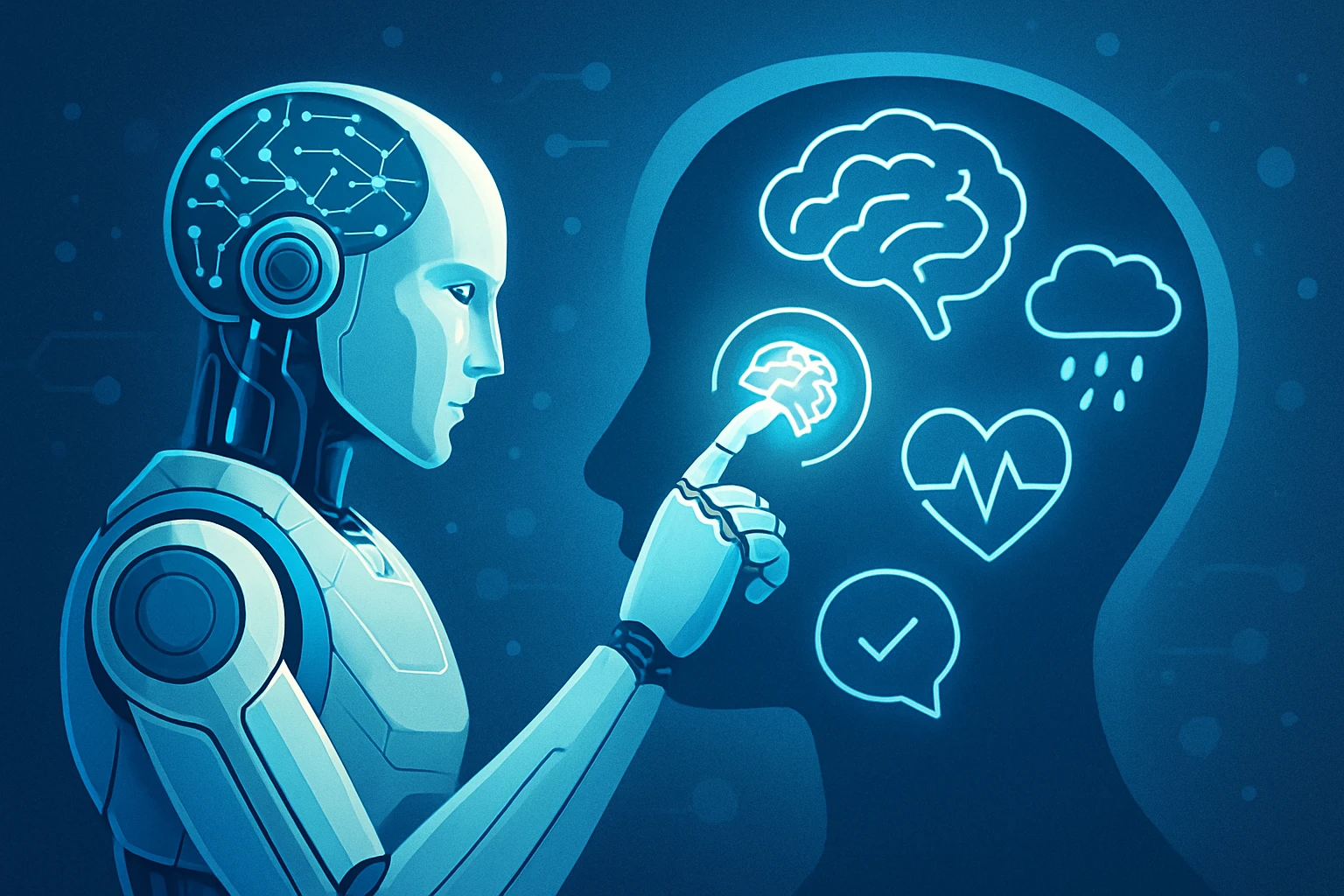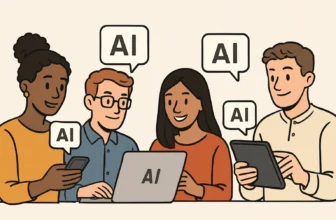
AI’s Revolutionary Leap in Psychiatry
Did you know that some AI mental health tools can detect signs of depression or anxiety just from the way you type or speak—sometimes with over 85% accuracy? Wild, right? It’s like your keyboard or app is quietly checking in on your emotional well-being. So, if you’re picturing some distant sci-fi future with robot therapists, hold up—in many ways, we’re already living in it.
But let’s back up a second. Because if you’re anything like me, you’ve probably felt a little skeptical (okay, maybe a lot) about words like “AI” and “psychiatry” in the same sentence. I mean, can a machine really “understand” feelings? Isn’t that what makes us… human?
Here’s where it gets interesting. As mental health professionals and patients, we face two big challenges: overworked clinics and under-diagnosed individuals. The reality? Many people wait weeks—or months—to get assessed and treated, and even then, human error or bias can sneak into diagnoses. That’s where AI comes in, not to replace professionals, but to support them in powerful ways.
How AI Is Changing the Game
So, how exactly is AI helping right now? Let’s break it down:
- Faster, more accurate diagnoses: AI diagnosis tools analyze language patterns, facial expressions, even vocal pitch to detect potential mental health issues—in real time. These tools can flag early warning signs, helping clinicians jump in before a crisis escalates.
- Personalized care plans: Platforms like Woebot or Wysa use AI-driven conversations to tailor recommendations based on how a patient feels right now, not just last week. This real-time responsiveness builds engagement (and honestly, just makes you feel heard!)
- Reducing clinician burnout: With AI streamlining admin tasks like charting or symptom tracking, professionals can refocus their time on what matters most—genuine human connection.
One of my favorite stories is about a friend of mine, a therapist who was drowning in paperwork. She started using an AI-powered tool for writing session notes, and the shift was immediate. Instead of spending hours after sessions typing, she finished early, felt less stressed and could actually be more present with clients. Total game-changer.
Why This Matters for You
If you’re a professional, this technology isn’t meant to outsmart or outshine your clinical judgment—it’s meant to amplify it. And if you’re a patient? It means you might get the help you need faster, with care that’s more responsive and personalized. Not cold or robotic. Just smarter.
So, whether you’re cautiously curious or totally tech-savvy, now’s the time to lean in. Because AI in mental health isn’t tomorrow—it’s right now. And together, we have a real shot at reshaping mental wellness for the better. Let’s explore how, shall we?
Understanding the Basics of AI in Psychiatry
Would you believe that AI can detect signs of depression from the tone of your voice—sometimes better than a human therapist? Wild, right? It’s not science fiction anymore. This is the world we’re stepping into with artificial intelligence in mental health care, and it’s both fascinating and a little mind-blowing.
If you’re a therapist, psychiatrist, or someone going through your own mental health journey, you’ve probably felt the weight of our current system. Long wait times. Limited access to resources. A whole lot of guesswork in getting the diagnosis right, especially for nuanced conditions like bipolar disorder or PTSD. I’ve had patients share the frustration of being misdiagnosed or waiting months just to talk to someone. It’s tough—and frankly, it shouldn’t be this hard.
What’s Going Wrong in Traditional Psychiatry?
The human brain is beautifully complex. That’s what makes psychiatric diagnoses so tricky. Two people can show completely different signs of depression. Or someone might be masking symptoms altogether. We rely heavily on self-reported symptoms, interviews, and clinical observations. And while those are deeply valuable, they’re also…human. Which means they’re subject to bias, fatigue, and even subconscious assumptions.
Here’s an example: I once spoke to a clinician who admitted they almost missed a patient’s early signs of psychosis because the client was just “too articulate.” That kind of snap judgment? It happens. Not because clinicians don’t care—but because we’re working with very human brains trying to understand other human brains.
Say Hello to AI, Your New Teammate
This is where AI can become a game-changer. Not as a replacement (don’t worry, therapists aren’t being replaced by robots), but as a powerful partner. Here’s how it’s already making waves:
- Machine Learning: Algorithms can detect patterns in huge sets of data—like responses to therapy, brain scans, or even social media posts—that a human might miss. It learns from experience, just like we do.
- Neural Networks: These mimic the structure of the human brain to make predictions. For psychiatry, this means more accurate symptom tracking, early detection of mood shifts, and even suicide risk assessment.
- Natural Language Processing (NLP): Ever chat with a friendly mental health chatbot? That’s NLP in action—analyzing the words we use to identify mental health patterns in real time.
And here’s a wow stat for you: One study showed that an AI model predicted schizophrenia with almost 90% accuracy just by analyzing how a person spoke. Whoa.
So, What Can You Do With This Info?
If you’re a mental health professional:
- Start small: Explore tools like sentiment analysis or AI-powered screening that complement your current workflow.
- Stay informed: Follow platforms and journals integrating AI in psychiatry—knowledge is power.
- Get ethical: Understand how data is being used and keep patient safety front and center.
If you’re a patient:
- Ask your provider: Are they using any AI-assisted tools? It’s okay to be curious.
- Try apps with AI features: One example is Woebot—an AI-powered chatbot that uses CBT principles to support you daily.
- Stay open, but cautious: AI is helpful, but not a cure-all. Use it alongside human support, not instead of.
A Hopeful Glimpse Ahead
AI can never replace the empathy of a human touch or the nuances of lived experience—but it might just offer that extra set of eyes we desperately need. Whether it’s giving overworked clinicians a data ally or helping someone recognize their own warning signs before it’s too late, AI’s role is still unfolding. But here’s the thing: you don’t have to be a tech genius to make it work for you. You just need to be a little curious—and open to the possibilities.
Because when we combine compassionate care with cutting-edge tech? That’s where the magic starts to happen. 💡
Benefits of AI Tools for Mental Health Professionals
Did you know that around one in five clinicians report spending more time on paperwork than with their patients? Yep. Instead of diving deep into treatment, many mental health pros are caught up in data entry, admin, and sorting through mountains of notes. Kind of heartbreaking, right?
Let’s be real—being a mental health professional is already a pretty emotionally demanding job. Add long hours, limited bandwidth, and an overwhelming caseload, and you’ve got a recipe for burnout. I’ve heard countless stories from therapists and psychiatrists who say they feel like robots themselves—going through motions and clicking boxes rather than making meaningful connections.
But here’s where things start to get interesting… because artificial intelligence (AI) is stepping in, not to replace clinicians, but to supercharge their capacity to care. Think of AI as your brilliant but low-maintenance assistant—quietly analyzing data, flagging concerns, and helping build smarter, more personalized treatment plans—all while you focus on the human-to-human work that actually heals.
So, how exactly is AI helping mental health pros like you?
- Faster, More Accurate Diagnoses: AI systems can scan clinical notes, past records, and symptom logs to detect patterns that might otherwise go unnoticed. A 2019 study even showed that AI could correctly diagnose depression just by analyzing voice and speech patterns—no lie!
- Personalized Treatment Planning: One-size-fits-all? Not anymore. AI tools can digest all that patient data—med history, therapy progress, even lifestyle inputs—and offer tailored treatment suggestions. It’s like giving every patient a game plan designed just for them.
- Reducing Admin Overload: Natural Language Processing (NLP)-powered transcription tools (hello, Dragon, Suki, and their cousins) are helping clinicians document sessions in real-time. No more late-night note typing or risking burnout from cognitive overload.
Here’s what it looks like in real life:
A friend of mine, Dr. Mendez, runs a small psychiatric practice. She told me she was initially hesitant to bring AI into patient care—she worried it might feel cold or impersonal. But as her caseload grew, she gave an AI-powered treatment planning app a try just to see… and within weeks, she said it was like having a second brain. It suggested medication adjustments based on side effect patterns she hadn’t noticed and even flagged patients who might be at risk of relapse based on their recent chat transcripts. She was blown away.
Where do we go from here?
If you’re in the mental health field and feeling swamped, it might be time to let AI lend a hand. You don’t need to be a tech wizard—many tools are designed to plug straight into your current workflow. Start small: try an AI-based note-taking app, or a clinical decision-support system. Follow what feels useful, and ditch what doesn’t.
The truth is, AI isn’t here to steal your job—it’s here to help you do it better, with less stress and more clarity. Imagine getting back those lost hours. Reconnecting with your purpose. Having space to breathe, think, and truly show up—for your patients and yourself.
Because at the end of the day, mental health work is about connection. Let’s use the smart tools out there so we can keep doing the deeply human work that no technology can replace.
Empowering Patients with AI Mental Health Tools
Did you know that nearly 60% of people struggling with mental health never receive treatment? It’s a gut punch, right? And it’s not always because they’re unwilling. Sometimes, it’s costs, lack of access, or the sheer overwhelm of where to even begin. If you’ve ever stared at your screen late at night wondering, “Is what I’m feeling normal?” — well, you’re definitely not alone.
I’ve been down that rabbit hole. Trying to track mood swings on paper. Downloading a meditation app, then forgetting I downloaded it. Writing notes in my phone at 2 a.m. only to lose them later. Mental health maintenance can feel like juggling water sometimes — you can try to hold it, but it slips right through. That’s where AI-based mental health tools are flipping the script.
Real-Time Support in Your Pocket
Imagine having a mental wellness companion that checks in with you — not once a week — but whenever you need it. AI-powered apps like Wysa, Youper, and Replika use natural language processing (fancy term for “they understand what you’re saying”) to offer real-time reflections, mood check-ins, and even gentle CBT-based exercises. It’s like texting a super calm, trained friend who always knows what to say — and never sleeps.
Feeling anxious? Pop in and chat. The app won’t judge if it’s 3 a.m. Or if you’re still in your pajamas. It’ll guide you through techniques based on your situation, whether that’s breathing, journaling, or just talking it out.
Daily Tracking Without the Eye Rolls
If you’ve ever tried to keep a mental health journal and lasted about three days (yep, guilty!), AI changes the game here too. These platforms do the heavy lifting, picking up patterns you might miss. One user noticed their mood plummeted every Sunday night — turns out, that was related to work dread. The app pointed it out; she made some small Sunday plans to reclaim that time. Boom. Change in outlook and control.
What You Can Do Right Now
- Try a chatbot app: Start with one like Wysa — it’s free to start and can help you ease into tracking your emotions day to day.
- Set reminders for quick check-ins: These apps let you log how you’re feeling in under a minute. Seriously, it’s like a mental selfie — no filters required.
- Compare patterns over time: Use the data insights (most apps summarize this weekly) to have better convos with your therapist or even just for yourself.
You’re More in Control Than You Think
Technology doesn’t replace therapists — and it shouldn’t. But these AI tools can act like stepping stones. They help you stay aware, feel supported, and actually start noticing what your brain and body are whispering to you throughout the day. Like having a co-pilot on this wild ride we call life.
Small check-ins today can lead to game-changing breakthroughs tomorrow. That’s the power of putting AI in the hands of patients. It’s not about making you robotic — it’s about helping you feel human, seen, and supported in all your imperfect glory. And I honestly believe that’s the kind of future we all deserve.
Navigating the Challenges and Ethical Considerations
Did you know nearly 70% of people say they’d be uncomfortable with AI making decisions about their mental health care? Honestly, I get it. Using AI for something as personal as mental health can feel… well, a little weird. Like, do I really want a robot analyzing my emotions or telling me which therapy might work best for my anxiety?
That’s the heart of the challenge, right? As exciting as AI in mental health care is, it’s not without its “Hold on a sec…” moments. We’re talking data privacy concerns, tough ethical questions, and the essential need for a real human behind the screen. Because let’s face it—no matter how advanced a chatbot gets, it can’t replace someone who truly understands your struggle.
The Heart of the Problem
If you’re a mental health professional, you’ve probably already wrestled with this. AI can help predict patient needs, offer round-the-clock support, and process data faster than any human. That’s gold in a field where resources can be limited.
But here’s the flip side: AI learns from data. And that data? It’s people’s deepest thoughts, emotions, diagnoses… all of which must be protected like a vault. If the wrong hands get access—or if the AI is trained on biased data—it can lead to serious consequences.
And from the patient side? It can feel super vulnerable knowing that an algorithm might influence your care plan. Are we really ready to trust AI with something so deeply human?
So, What Can We Do About It?
No doom and gloom here—there are powerful (and practical!) ways we can tackle these issues responsibly. Let’s break it down:
- Prioritize Transparent AI: Make sure the AI tools you use aren’t black boxes. Ask questions: How does it make decisions? What data was it trained on? Patients have the right to know and understand.
- Keep Privacy Locked Down: Choose platforms that comply with HIPAA or similar regulations. Bonus points for encryption and clear, consent-first data policies.
- Never Remove the Human: Think “AI + therapist,” not “AI instead of therapist.” Use AI for support, insights, or administrative relief, but never as a full replacement. We need empathy, and that’s still exclusive to humans… for now.
What This Looks Like in Real Life
I once worked with a therapist who tried an AI journaling app with her clients. She loved how it helped clients track moods and get gentle nudges to reflect—but she made sure every session included time to discuss those entries, human to human. And you know what? Her clients felt more supported, not less.
It was that blend—the power of tech with the warmth of human care—that made all the difference.
Big Picture? It’s All About Balance
AI isn’t here to take your job or your therapy experience. It’s here to lend a hand, if we let it. As we navigate this brave new digital frontier, staying thoughtful, ethical, and human-first will be what keeps mental health care safe and effective.
So let’s keep asking the tough questions, demanding transparency, and leading with heart. Because when we use tech with care? Everybody wins.
Embracing the Future of AI in Mental Health
Did you know that some AI tools can now detect signs of depression with more than 85% accuracy—just by analyzing speech patterns or written text? Wild, right? It’s like something out of a sci-fi movie, but this is real life. And it’s happening right now.
If you’re a therapist trying to manage a growing caseload or a patient juggling flare-ups and finding the right support—well, yeah, it can be overwhelming. We’ve all had moments where we just wish someone (or something) could help make sense of the noise. I’ve personally chatted with friends in the field who’ve said, “I just want more accurate ways to track progress without spending hours on paperwork.” Sound familiar?
So… how is AI actually helping?
Here’s where it gets exciting. AI isn’t about replacing humans (we still have the edge on empathy, thankfully). It’s about amplifying what’s already working, filling in the gaps, and making mental health support more accessible and personalized.
- Smarter Diagnoses: Tools like natural language processing can pick up on subtle emotional cues that may go unnoticed in a rushed session. That means earlier warnings, better interventions—without relying solely on “gut feeling.”
- Personalized Treatment Plans: AI algorithms can analyze patterns across huge datasets (think thousands of records), helping professionals tailor therapies that are more likely to work for that specific person.
- On-Demand Support: Apps powered by AI (like Woebot or Wysa) offer 24/7 mental health support. They’re obviously *not* a substitute for therapy, but between sessions? They can be game-changers for managing stress, anxiety, or just having someone (well…something) to talk to.
Here’s what you can do right now:
- If you’re a clinician: Start exploring platforms like Ginger or Spring Health that blend AI-driven analytics with therapy. See how they could streamline the intake and monitoring process.
- If you’re a patient or client: Try out a well-reviewed AI-based app for mental well-being. Keep a journal of how you feel, and note if it helps you feel less isolated or more in control.
- For both: Stay curious. Read up on ethical AI in psychology. Ask questions. Advocate for transparency and inclusion as AI tools become more prominent.
Look, we’re not saying AI can hold your hand through a panic attack or offer a knowing nod after a tough share… but it can absolutely be part of your toolkit. Better diagnosis. Better support. Better outcomes.
So… ready to explore? Whether you’re a passionate practitioner or someone navigating your own path to healing, AI isn’t a distant trend—it’s here, and it wants to help. Not in place of care, but as a partner in it. Let’s lean into the future—together.












